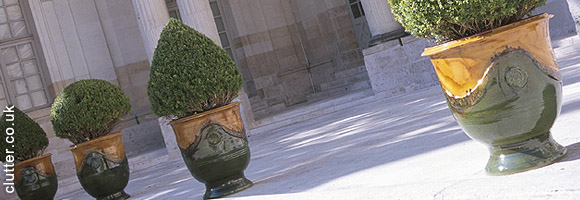Outdoor clutter can consist of sheds, garages, conservatories, lean to’s, gazebos, porches, garden ornaments (you know I’m going to say gnomes), dustbins, unruly bushes or trees, overgrown ponds, and junk left over from the builders.This sort of clutter can be ignored easily because we are not looking at it all day long, especially if it is in the back garden.
However the clutter in our garden is noticed by our neighbours and it has a subliminal effect upon ourselves. If the clutter is in the front garden then it is noticed by everyone, from our visitors, to the postman, and even by people who drive past and who will get an unfavourable impression of your neighbourhood from your front garden clutter. The impression your visitors and neighbours will get of you from your junk doesn’t need to be spelt out, does it?
Garden clutter
Outdoor clutter can often consist of builders rubble, old doors, bits of plastic guttering, left over sacks of sand or cement, etc. This looks very unsightly and takes up precious space. Get a skip delivered, get the builders to collect it, or take it to the tip yourself if your car is up to the job. While it is hanging around it is having a detrimental effect upon you and the whole neighbourhood as well.
Another type of garden clutter is garden ornaments, gnomes, animal statues, over- elaborate wall fountains, and the like. These are very popular with some people, others hate them. The important factor here is not to overdo it. A few gnomes in moderation will be acceptable to most people, but if you have too many, then your garden will look untidy and could be difficult to navigate without tripping over a gnome or a stone toad.
Shed clutter
Sheds are generally full of garden tools, garden fertilizer, compost, slug pellets, paint, varnish, paint brushes, rollers, filler, woodstain, buckets, beach windbreakers, outdoor children’s toys, camping equipment and anything else which we don’t want to keep in the house. The trouble is that a lot of this stuff never gets used and just sits there going rusty and gathering dust. It becomes a fantastic breeding ground for insects, slugs, and the like, and when we do want to find the items we do actually use, we have to fight our way past all this clutter, acquiring cobwebs and strange metallic stains on our clothes in the process. A shed clear out is messy and best done on a day when it is not frosty or pouring with rain. Unpleasant as this task may be, you will be delighted when it is done at the amount of space freed up, and the ease with which you will be able to find things after this.
Garage clutter
Garages, as everyone knows, are meant to keep cars in, but how many are actually used for this purpose? Many households have one or more cars sitting on the driveway because the garage is occupied by utter junk. Garage clutter has quite a lot of overlap with shed clutter, except that garages are generally bigger so you can fit even more stuff into them! You have to sacrifice a dry home for your car, but maybe you feel that is a small price to pay for all that lovely storage space.
The problem is that your car will be depreciating much faster in the driveway in all that rain and wind, and is more at risk from vandalism and burglars, not to mention your insurance premiums will be higher if the car is kept outside. If you look at all that important stuff you are storing in your garage you may decide that your car is more valuable! After all, empty or nearly empty tins of paint in odd colours, rusty garden tools, chemicals with the labels so faded that you are not quite sure what they are, a plastic paddling pool with a puncture, a tent that you last used when you were eighteen: are these thing really as precious as you car?
If you throw away all the empty things, the bottles without labels, rusty items, stuff you haven’t used for ten/twenty years, then this will be a good starting point. When you see a bit of empty space appearing you will be encouraged to be more ruthless and throw away the paint in colours you don’t like, the damp wallpaper left over from your decorating, the lawn mower you haven’t used since you had the garden paved over, the wheel trims to all your previous cars, etc.
Plant clutter
Oversized bushes and trees can make a garden seem small, untidy and difficult to navigate. If a window is overshadowed by too big bushes or by climbing plants like ivy then the room inside can become gloomy and dark. The worst aspect of this kind of living clutter is the impression that it gives to all who visit. If your garden is a jungle then people will wonder what kind of state your house is in and what this indicates about your efficiency, standards of cleanliness and overall attitude to life. If your garden can’t be navigated without getting muddy feet or torn clothes then people will not be very keen to visit you.
Trim down large bushes, or remove them, chop down trees that are too large or get a tree surgeon in to prune them properly, pull up weeds and make sure paths are easily navigable. If your bushes need too much pruning, then replace them with dwarf varieties that never get too big, and if they have nice flowers in the spring or summer, then this is a colourful bonus and will cheer up you, and your visitors.
Now that we have circumnavigated all the rooms in your house, and even the outside, and listed and defined all the clutter danger areas, it is time to move on to releasing clutter.


